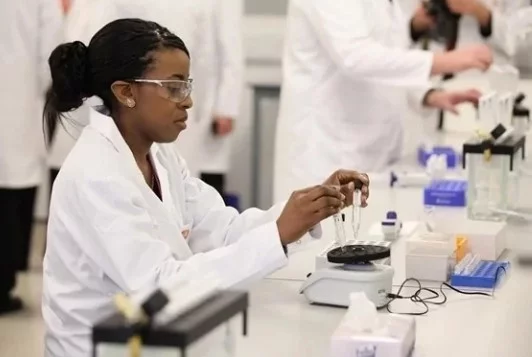Share this Post
Medical Laboratory Science (MLS) is a vital field in healthcare, focusing on the diagnosis, treatment, and prevention of diseases through laboratory testing.
As the demand for skilled laboratory professionals grows in Nigeria, choosing the right university to study Medical Laboratory Science is crucial for a solid educational foundation and a successful career.
This article highlights the best universities in Nigeria offering MLS and what makes them stand out.
Medical Laboratory Science in Nigeria
Medical Laboratory Science is a regulated profession overseen by the Medical Laboratory Science Council of Nigeria (MLSCN).
The program is structured to provide theoretical knowledge and practical skills in areas such as clinical chemistry, microbiology, hematology, histopathology, and immunology.
Graduates of MLS are equipped to work in hospitals, diagnostic labs, research centers, and public health institutions.
Best Universities Offering Medical Laboratory Science in Nigeria
Here are the best Universities offering medical laboratory science in Nigeria:
University of Lagos (UNILAG)
Why It Stands Out:
- Reputation: UNILAG is one of Nigeria’s most prestigious universities and has a strong reputation for its health sciences programs.
- Modern Facilities: The university boasts state-of-the-art laboratories equipped with advanced diagnostic tools.
- Experienced Faculty: The MLS program is taught by highly qualified lecturers and professionals in the field.
- Accreditation: UNILAG’s MLS program is accredited by MLSCN, ensuring high educational standards.
University of Nigeria, Nsukka (UNN)
Why It Stands Out:
- Comprehensive Curriculum: UNN offers a rigorous MLS program covering all aspects of medical laboratory science.
- Research Opportunities: Students are encouraged to participate in research projects, particularly in tropical disease diagnosis.
- Clinical Exposure: The university has affiliations with teaching hospitals where students gain hands-on experience.
- Strong Alumni Network: Graduates of UNN’s MLS program are well-represented in the healthcare sector across Nigeria.
University of Ibadan (UI)
Why It Stands Out:
- Historical Excellence: As Nigeria’s premier university, UI has a long history of excellence in medical sciences.
- World-Class Facilities: The MLS program benefits from the university’s well-equipped laboratories and research centers.
- Interdisciplinary Approach: UI emphasizes collaboration with other health sciences disciplines, enriching students’ learning experiences.
- Global Recognition: UI consistently ranks among the top universities in Nigeria and Africa.
Ahmadu Bello University, Zaria (ABU)
Why It Stands Out:
- Wide Course Coverage: ABU’s MLS program includes in-depth training in diagnostic techniques, laboratory management, and quality control.
- Affordable Fees: As a federal university, ABU offers quality education at a lower cost compared to private institutions.
- Diverse Student Body: The university attracts students from across Nigeria, providing a rich cultural and academic environment.
Bayero University, Kano (BUK)
Why It Stands Out:
- Focus on Community Health: BUK’s MLS program emphasizes public health and the diagnosis of diseases prevalent in Northern Nigeria.
- Strong Clinical Training: Students have access to Aminu Kano Teaching Hospital, one of the best in the region, for clinical rotations.
- Skilled Faculty: The department is staffed with experienced professionals who provide mentorship and guidance.
Nnamdi Azikiwe University, Awka (UNIZIK)
Why It Stands Out:
- Innovative Curriculum: UNIZIK’s MLS program integrates modern diagnostic technologies and research into its teaching.
- Hands-On Learning: Students undergo extensive practical training in well-equipped laboratories.
- Research Opportunities: The university encourages students to engage in research, particularly in molecular diagnostics and emerging diseases.
Factors to Consider When Choosing a University
When deciding where to study Medical Laboratory Science in Nigeria, consider the following factors:
- Accreditation: Ensure the program is accredited by the Medical Laboratory Science Council of Nigeria (MLSCN).
- Facilities and Equipment: Look for universities with modern laboratories and diagnostic tools.
- Clinical Training Opportunities: Access to teaching hospitals for clinical rotations is crucial.
- Reputation: A university’s ranking and reputation in health sciences can impact job prospects.
- Cost: Evaluate tuition fees and other expenses to ensure affordability.
Career Opportunities for MLS Graduates in Nigeria
Graduates of Medical Laboratory Science can explore a variety of career paths, including:
- Diagnostic Laboratories: Working in hospitals or private labs to analyze patient samples.
- Public Health: Contributing to disease surveillance and outbreak management in public health institutions.
- Research and Development: Conducting research in universities, research centers, or pharmaceutical companies.
- Laboratory Management: Managing medical laboratories and ensuring quality control.
- Academia: Teaching and mentoring future MLS students in universities or training institutions.
Challenges and Prospects
Challenges:
- Limited Resources: Some universities struggle with inadequate laboratory facilities and outdated equipment.
- Funding: Insufficient funding for research and infrastructure in public universities.
Prospects:
- High Demand: The growing need for diagnostic services and public health experts ensures job opportunities for MLS graduates.
- Global Opportunities: MLS graduates can pursue international certifications, making them eligible for global job markets.
Conclusion
Medical Laboratory Science is a rewarding and essential field in healthcare. Choosing the right university is vital for acquiring the knowledge and skills needed to excel.
Universities like UNILAG, UNN, UI, ABU, BUK, and UNIZIK offer excellent MLS programs, combining theoretical instruction, practical training, and research opportunities.
By considering factors such as accreditation, facilities, and clinical exposure, aspiring students can make informed decisions about their educational journey.
With determination and a solid educational foundation, MLS graduates in Nigeria can contribute significantly to healthcare and diagnostic services both locally and internationally.





